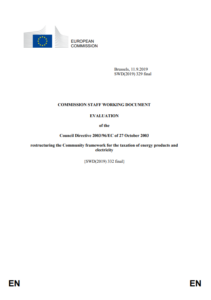The EU evaluated the existing report about energy taxation which was firstly launched in 2003, given that when the EU rules on energy taxation no longer deliver the same positive contribution as when they first came into force.
Specifically, the evaluation of the Energy Taxation Directive (DTV) explores additional environmentally friendly policies and how they could support EU’s climate change goals.
According to the evaluation, the EDT implements rules for the taxation of energy products used as motor or heating fuels and for electricity. Yet, ‘while it initially made a positive contribution to the internal market, current rules do not contribute to the new EU regulatory framework and policy objectives in the area of climate and energy, where technology, national tax rates and energy markets have all evolved considerably over the past 15 years.’
[smlsubform prepend=”GET THE SAFETY4SEA IN YOUR INBOX!” showname=false emailtxt=”” emailholder=”Enter your email address” showsubmit=true submittxt=”Submit” jsthanks=false thankyou=”Thank you for subscribing to our mailing list”]
The evaluation also highlights that the EU’s 2030 climate targets, including GHG emissions reduction, don’t follow the current EU’s energy taxation framework.
Following, ECSA, INTERFERRY, EUDA, and CLIA Europe highlight that an evaluation of the current report was long awaited, as the directives need updates. Moreover, the stakeholders understand that the Directives don’t provide equal treatment of energy supplies to the shipping industry.
All interested parties acknowledge the importance of a revised EU Energy Taxation Directive to provide a mandatory EU wide taxation exemption for all energy carriers, such as fuels and electricity, including shore-side. Such level playing field would help close the cost gap between Heavy Fuel Oil and alternative fuels and electricity.
We strongly believe energy taxation should be used to enable the transition to the decarbonisation of transport by incentivizing the uptake of low-carbon and carbon-free alternative fuels and to remove disparities in energy taxation
… ECSA’s Secretary General, Martin Dorsman stated.
Concluding, to explore more click on the PDF herebelow






























































